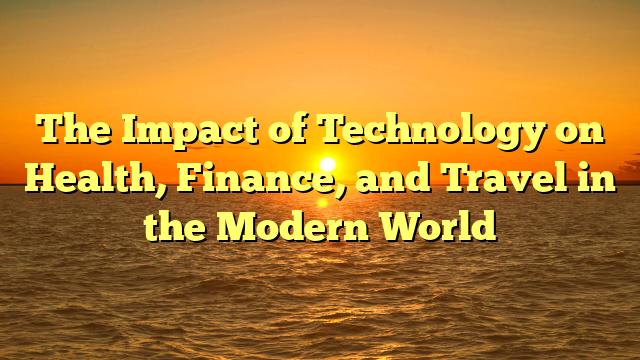In today’s fast-paced world, four major elements — health, technology, finance, and travel — are intricately connected, shaping the way people live, work, and interact with the world. The rapid advancements in each of these areas have led to profound changes in how individuals approach their daily lives, pursue their dreams, and even achieve a sense of well-being. This article will explore how these four elements interrelate, their impact on society, and how they are transforming various industries.
1. Health and Wellness: A Modern Perspective
Health has always been a crucial aspect of life, but in recent years, there has been a significant shift in how individuals approach well-being. With the increasing prevalence of chronic conditions, mental health issues, and lifestyle-related diseases, people are more conscious of maintaining their health than ever before.
Modern advancements in healthcare have led to better treatments, early detection, and personalized health plans. Moreover, the integration of innovation into healthcare has transformed the way individuals monitor and manage their health. Wearable devices and mobile health applications allow individuals to track their physical activity, nutrition, and even sleep patterns in real-time.
The emergence of telemedicine has also transformed the healthcare landscape, offering people access to consultations with healthcare professionals from the comfort of their homes. This has been especially beneficial for individuals in remote areas or those with mobility issues. As healthcare becomes more digitized, individuals are gaining more control over their own health.
However, it is not just physical health that is becoming a focus. Mental health has gained increasing importance, with technology playing a significant role in providing support. Online therapy platforms, meditation apps, and virtual wellness communities are helping individuals cope with stress, anxiety, and other mental health challenges.
2. The Role of Technology in Modern Life
Technology is one of the driving forces behind many of the changes seen in health, finance, and travel. The rapid advancements in artificial intelligence, machine learning, and automation are reshaping industries and creating new opportunities for individuals and businesses alike. In healthcare, for instance, AI is being used for diagnostic purposes, predicting disease outcomes, and even developing personalized treatment plans.
Moreover, technology has streamlined financial management. Fintech solutions such as mobile banking apps, online investment platforms, and digital wallets have made financial services more accessible and user-friendly. People no longer need to visit a bank in person to check their balances, transfer money, or invest in stocks. This ease of access has democratized financial opportunities, allowing people from all walks of life to manage their finances more efficiently.
Technology’s impact on travel is equally profound. The advent of online booking platforms, travel apps, and real-time navigation systems has made traveling more convenient, affordable, and accessible. Today, individuals can easily compare prices for flights, hotels, and car rentals, as well as find recommendations for attractions and activities. Furthermore, technology has enabled the rise of the “sharing economy,” with platforms like Airbnb and Uber allowing people to travel more affordably while connecting with local communities.
3. Finance in the Digital Age
The world of finance has undergone a major transformation in recent years, largely due to advancements in technology. Traditional banking is being replaced by digital financial solutions, and the rise of cryptocurrencies and blockchain technology is adding complexity to the financial landscape.
Cryptocurrencies like Bitcoin and Ethereum have sparked a financial revolution, providing a decentralized, digital alternative to traditional currencies. While still relatively volatile, cryptocurrencies have gained widespread attention, with investors seeing them as both a store of value and a means of exchanging goods and services online.
In addition to cryptocurrencies, blockchain technology is being explored for its potential to enhance security and transparency in financial transactions. Financial institutions are increasingly adopting blockchain to reduce fraud, speed up transactions, and streamline regulatory compliance processes.
slot demo pg , including mobile payment systems like Apple Pay, Google Wallet, and Venmo, have also gained popularity in recent years. These solutions allow for instant, secure transactions without the need for physical credit cards or cash. In emerging markets, mobile payments are providing financial inclusion to people who may not have access to traditional banking services.
Additionally, the rise of robo-advisors and algorithmic trading has democratized investment opportunities. These platforms offer automated, low-cost investment strategies, allowing individuals to invest in diversified portfolios without the need for professional financial advisors.
4. Travel and Tourism in the 21st Century
Travel has long been a means of escape, adventure, and cultural exchange. However, the landscape of travel has changed dramatically with the advent of technology. Gone are the days of relying on travel agents to book flights and accommodations. With a few clicks, travelers can now plan their entire trip from the comfort of their own homes.
One of the most significant changes in the travel industry is the rise of online travel agencies (OTAs). Websites like Expedia, Booking.com, and Skyscanner allow travelers to compare prices for flights, hotels, and rental cars, enabling them to make informed decisions and save money. Additionally, these platforms offer customer reviews and ratings, helping travelers choose the best options for their needs.
Technology has also made it easier for people to explore new destinations. Virtual reality (VR) and augmented reality (AR) are being used to offer virtual tours of famous landmarks, museums, and cities. This technology is helping people to experience destinations before they even book their trips. Furthermore, AI-powered chatbots and travel assistants are available to help answer questions, provide recommendations, and offer real-time assistance during a trip.
Sustainability is also becoming a key focus within the travel and tourism industry. With growing awareness of climate change and environmental conservation, many travelers are seeking eco-friendly options, such as sustainable hotels and eco-tourism destinations. Airlines and travel companies are also making efforts to reduce their carbon footprint by investing in greener technologies, like electric airplanes and renewable energy.
Conclusion: A World of Opportunities
The convergence of health, technology, finance, and travel presents a world of opportunities for individuals and businesses alike. With technology continuing to evolve, people are more empowered than ever to take control of their health, manage their finances, and explore the world. These four elements are reshaping industries and driving innovations that will continue to impact society in profound ways.
As we look ahead, we can expect even more integration of these sectors, with artificial intelligence, the Internet of Things (IoT), and blockchain technology playing a central role in shaping the future. As individuals, it is important to stay informed and adapt to these changes, embracing the opportunities they bring while also considering their potential impacts on society and the environment.
In the end, the intersection of health, technology, finance, and travel offers endless possibilities. By leveraging the power of these fields, individuals can lead healthier, more fulfilling lives while navigating the complexities of modern society.
Title: The Interplay of Health, Technology, Finance, and Travel in the Modern World


